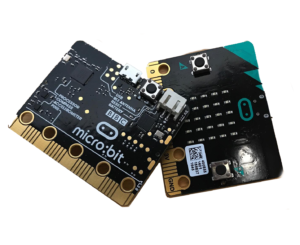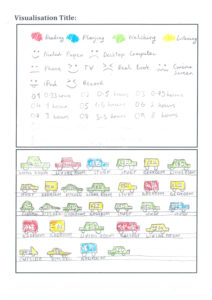We know from our teacher community it can be difficult to travel for professional learning so we’re changing our professional learning (PL) model and bringing our workshops to schools in the Edinburgh and South East of Scotland area (Fife, Edinburgh, West Lothian, Midlothian, East Lothian, Scottish Borders). If you are based outside of these authorities we hope you will continue to take advantage of our resources, National Progression Award in Data Science programme, and our events.
About our workshops
- Our free workshops will be bookable on Friday afternoons. Other days can be arranged – just ask by emailing dataschools@ed.ac.uk using ‘PL workshops’ in the subject field.
- We’ll bring everything we need with us for each session or we will let you know if a workshop requires you to provide specific facilities.
- The more the merrier. You can host a workshop for your school or your entire cluster!
- If you would like, our university student volunteers can also run a session for your learners. This can be arranged once we’ve confirmed the date for your PL workshop.
How to book
- Identify which workshop(s) you’re interested in from the descriptions below.
- Complete the workshop booking form
- We will get in touch to answer any queries you may have, and to confirm which of your preferred dates the workshop will take place on.
- Confirm the date with those you’ve invited from your school/cluster.
- Make yourself a cup of tea and put your feet up – we’ll arrange the rest!
Data and information handling across the curriculum

Data literacy is increasingly important for understanding our world and a crucial skill for our learners moving into the workplace. But what is data literacy and how can we teach it? This session will introduce you to fun activities that cover outcomes in numeracy, literacy, science, Computing Science and other STEAM subjects.
Find out how learners can explore sustainable development goals such as plastics in the ocean, or topical issues such as refugees using data skills. Encourage learners to be critical activists by investigating issues in their communities then use data to propose and implement solutions.
Aimed at Primary and Secondary teachers. Can be tailored for particular levels.
You will need to provide: The workshop will involve a presentation and several practical activities. No computers required. We will need seats for all participants and tables for groups to use for practical activities…. and space to fly some paper airplanes!
Intro to Micro:bits
Learn about the new Micro:bits and how they can be used to support learning across the whole curriculum. We will show you how to use these little computers, how to code them using drag and drop blocks, and how to support your learners in a range of activities from making a musical jukebox to competing in a radio beacon treasure hunt! Learners can then use the micro:bits to sense and track changes in the world around them.
Aimed at teachers of BGE Level 2-3.
You will need to provide: A computer classroom or laptops/tablets for all participants. We can provide Micro:bits or we can use the sets that have been sent to your schools.
More Micro:bits and Data
 Make data shine! Learn how to use Micro:bits to create data visualisations using LEDs. Gather data then illuminate a pie chart then make a visual sound meter in this step-by-step workshop using Micro:bits and Zip Halos. You will then be able to borrow our Zip Halo kit and accompanying lessons to use with your learners.
Make data shine! Learn how to use Micro:bits to create data visualisations using LEDs. Gather data then illuminate a pie chart then make a visual sound meter in this step-by-step workshop using Micro:bits and Zip Halos. You will then be able to borrow our Zip Halo kit and accompanying lessons to use with your learners.
Aimed at teachers of BGE Level 2-4.
You will need to provide: A computer classroom or laptops / tablets for all participants. We can provide Micro:bits or use the sets that have been sent to your schools. We will bring a set of ‘Zip Halo’ to use during the workshop and you will be able to borrow this kit to use with learners afterwards.
Data Escape Room
Use your data skills to save your team from the evil Vikings! You and your team will need to sneak in and find the plans to the Vikings’ WMD (Weapon of Maths and Data) and foil their plans by stealing the laser-targeting diamond from the safe, using only your wits and your data interpretation skills to solve the puzzles.
In this workshop we will have a short presentation to showcase our escape room activities for learners, then teams of teachers compete to see who can ‘escape’ the fastest! Liven up departmental time by trapping your staff in a room*?!
*Room not actually locked!
Aimed at teachers of BGE Level 2-4.
You will need to provide: a couple of small rooms or offices to use to host the escape rooms. We can run two escapes rooms concurrently, each for five people. This can run alongside departmental/faculty time or personal development time.
My Data and Art
 Find out how to teach learners to gather and use data about themselves and their interests through different drawing and visualisation techniques. Bring together art and information in a gentle and beautiful way using our ‘Dear Data’ set of STEAM lessons.
Find out how to teach learners to gather and use data about themselves and their interests through different drawing and visualisation techniques. Bring together art and information in a gentle and beautiful way using our ‘Dear Data’ set of STEAM lessons.
We will also showcase our live lesson on ‘Data Selfies’ where Learners share data about themselves including their height, eye colour and hobbies. Running the code produces a visualisation which learners can then send to a virtual portrait gallery.
Aimed at teachers of BGE Level 2-4.
You will need to provide: A computer classroom or tables and laptops for all participants.
Using Data Around Us:
How can you detect a volcanic eruption on the other side of the world using a pressure sensor? How can you predict when your class feel snoozy using a CO2 monitor? Learn more about the Internet of Things (IoT) project and the use of classroom sensors that gauge CO2, temperature, humidity, air pressure and light levels to support data learning.
You will need to provide: The workshop will involve a presentation and several practical activities. No computers required. We will need seats for all participants and tables for groups to use for practical activities.



